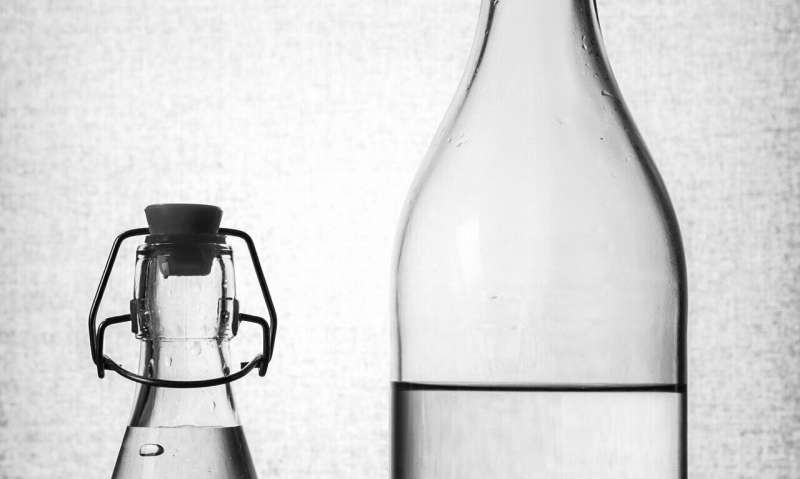Alkaline water: Should you be splurging to make your body less acidic?

As a medical doctor, [I find that] the explosion of interest in alkaline water in recent years has been very concerning. Alkaline water consumption is projected to hit a market capitalization of $1.3 billion by 2023. No doubt this is driven by clever marketing advertising alkaline water as an easy way to “make your body less acidic.”
For many people, the idea of a more alkaline and less acidic body sounds ideal. However, what does that actually mean for the way our body functions naturally? And are the many health benefit claims of alkaline water substantiated?
First, an important clarification. Drinking water can be labeled as alkaline in two different circumstances.
Water can be naturally alkaline water if it picks up minerals such as calcium and magnesium after passing over rocks in natural springs. San Pellegrino water is a classic example of sparkling water that contains these important minerals.
Artificial alkaline water can also be chemically produced for popular consumption. Manufacturers use a process called electrolysis to separate the water molecule into acidic and alkaline components; the acidic components are then cycled out. Doing so increases the pH of the water—the higher the number, the more alkaline the water. The pH of regular water is 7, the exact center of the scale. Alkaline water products feature a pH as high as 9.5-10. Proponents argue that a higher pH and alkalinity correspond to a proportionally greater benefit.
Many alkaline waters on the market feature both electrolysis and a higher pH, as well as add important minerals like magnesium and calcium.
Claim: A less acidic body is better
The main claim by alkaline water manufacturers is that a less acidic, more alkaline body is better or healthier. The human body—mostly regulated by the lungs and kidneys—maintains a healthy balance between acidity and alkalinity. The standard normal pH is kept in a tight range of 7.35 to 7.45.
Any extreme change in pH—acidotic or alkaline—can be dangerous, but the body will quickly work to compensate. However, the gastrointestinal and urinary systems do function at a more acidotic level at baseline in order to perform many important tasks and to protect us from infection.
We know that a more alkaline urine increases the chances of a bacterial infection taking hold and causing a urinary tract infection. Thus, there is actually a strong reason to ensure that the urine stays more naturally acidic. Newer research has actually challenged that conventional wisdom, in fact. Urine samples closer to the neutral pH of pure water actually showed a higher level of the protein siderocalin. Siderocalin prevents bacterial growth in the urine by blocking the ability of microorganisms to acquire iron.
The pH of the stomach is extremely acidic, ranging from 1.5 to 3.5. This is primarily due to stomach cells producing hydrochloric acid. We depend on this lower pH to break down proteins and also to kill bacteria, viruses and other pathogens. That being said, the stomach will do a good job at re-acidifying and regulating alkaline water before it can do anything of substance, but in large enough quantities, it could be problematic. In fact, alkaline water can cause stomach bloating and cramping in people with sensitive stomachs.
Claim: Better hydration
Another important claim to look at is whether alkaline water is better at rehydration after exercise. The hypothesis is that dehydration increases blood viscosity or thickness, and that alkaline water post-workout does a better job at reducing blood viscosity than water at a normal pH level. An oft-cited small study of 100 health adults showed that electrolyzed, high-pH water reduced viscosity by 6.3% compared to 3.36% in those who took standard water after exercise.
This was a small, limited study. Researchers were able to show that alkaline water reduced blood viscosity [more] when compared to regular water. And their results were significant, signified by a p-value of 0.03 (p-value <0.05 means that a study showed an actual difference and this wasn't by chance). However, is reduced viscosity important when rehydrating after exercise? Unclear. We definitely need more research in this area.
If you’re looking for more efficient hydration, there’s stronger evidence to support adding electrolytes and other minerals to regular water. Electrolytes are super important for helping cells transport water across cell membranes. And they regulate and control the balance of fluid in the body. Sodium, potassium, calcium and magnesium are the key players. After a particularly strenuous or sweaty workout, we are deficient in a lot of key electrolytes.
Claim: Reduction of ‘acid ash’
The most concerning pseudo-science from proponents of alkaline water is based on the so-called acid ash hypothesis. Some researchers claim that a Western diet heavy in meat, cheese, grains and fish leads to an excess acid load that is the root cause of diseases, particularly bone disease like osteoporosis. The “ash” refers to whether combustion of certain foods leads to more acid or alkaline byproducts. A more alkaline diet—consisting of alkaline ash foods and alkaline water—is hypothesized to offset this excess acid.
Fortunately, we now have multiple systematic reviews and a meta-analysis showing no evidence that intake of certain ash-producing foods leads to an increased risk of osteoporosis.
Source: Read Full Article


